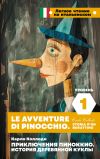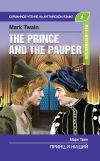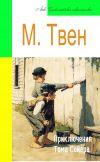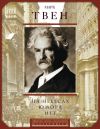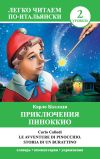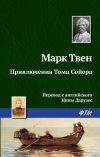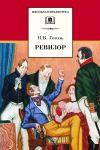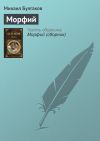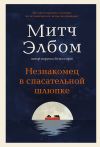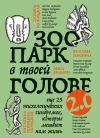
Автор книги: Марк Твен
Жанр: Иностранные языки, Наука и Образование
Возрастные ограничения: +12
сообщить о неприемлемом содержимом
Текущая страница: 1 (всего у книги 5 страниц) [доступный отрывок для чтения: 1 страниц]
Твен М.
Приключения Тома Сойера. адаптированный текст + задания. Уровень B1
© А. Грек, адапт. текста, коммент. и словарь, 2022
© ООО «Издательство АСТ», 2022
* * *
Charter 1
* * *
‘TOM!’
No answer. ‘TOM!’
No answer.
‘What happened with that boy, I wonder? You TOM!’
No answer.
Aunt Polly looked everywhere, she even bent down, poked under the bed with the broom, and found nothing but the cat.
‘Y-o-u-u TOM!’
There was a slight noise behind her and she turned just in time to catch a small boy.
‘There! What have you been doing in the pantry?’
‘Nothing.’
‘Nothing! Look at your hands. And look at your mouth. What IS it?’
‘I don’t know, aunt.’
‘Well, I know. It’s jam – that’s what it is. I’ve told you forty times not to touch it. Where’s my switch?–’
‘Wow! Look behind you, aunt!’
The old woman turned round, and Tom managed to run away from her – he climbed up the high fence, and disappeared over it.
His aunt Polly stood surprised a moment, and then laughed.
‘I can never learn anything! He’s played the same trick enough for me to remember it! You can’t learn an old dog new tricks I’m sure he won’t go to school this afternoon, and I’ll just have to make him work tomorrow, to punish him. It’s hard to make him work on Saturdays, when all the boys are having holiday. But he hates work more than he hates anything else, so I’ve GOT to find some job for him.’
Tom didn’t go to school, and he had a very good time.
While the boy was eating his dinner, and stealing sugar when he had a chance Aunt Polly asked him difficult questions about his classes – she wanted to make him tell her the truth.
Tom was clever enough in his answers.
She wouldn’t know that Tom was lying if it hadn’t been for Sid, his younger brother.
To make the long story short Aunt Polly discovered the truth: Tom hadn’t been to school and he had been swimming instead.
As soon as it became clear Tom went out at the door saying:
‘Siddy, I’ll beat you for that.’
Tom was not the model boy of the village. He knew the model boy – Sid – and hated him sometimes.
Within two minutes, or even less, he had forgotten all his troubles because he found a new interesting activity – whistling. He had learned to whistle a couple of days ago and now he decided to practise it.
The summer evenings were long so he had a lot of time ahead.
Then he saw a stranger boy a little larger than himself. Meeting a newcomer of any age of either sex was an important in the poor little village of St. Petersburg. This boy was well dressed – on a week-day. He even had shoes on – and it was only Friday. You could see that he was a city boy. The more Tom stared at the stranger, the higher he turned up his nose. He could feel that his own clothes were old and poor. Neither of the boys spoke. If one moved, the other moved – but only to the side; so they were moving in a circle; keeping face to face and eye to eye all the time.
Finally Tom started a usual dialogue. Each of the boys said he was going to beat the other one. And each said he had an elder brother who could also beat the other’s elder brother.
Finally they fought.
They were rolling in the dirt, tearing each other’s hair and clothes, covering themselves with dust and glory.
Tom won.
The new boy went off brushing the dust from his clothes, sobbing, and shouting what he would do to Tom the ‘next time he caught him.’
When Tom’s turned to go, the new boy took a stone, threw it, hit him Tom between the shoulders and then ran away as fast as he could. Tom chased him home, and waited at the gate for some time, inviting the enemy to come outside. At last the enemy’s mother appeared, and called Tom a bad, evil child.
Tom got home rather late that night, and when he climbed in through the window, he was caught by his aunt immediately. When she saw the state of his clothes she decided that Tom would not enjoy his Saturday.
* * *
Saturday morning came, and all the summer world was bright and fresh. There was a song in every heart and a smile on every face. But Tom was not very happy when he appeared in the street with a bucket of whitewash and a long-handled brush. When he looked at the fence, so long and high, he felt depressed.
Then he saw Jim, a slave boy, who was running out of the gate with a bucket. Tom himself had always hated bringing water from the town pump. But it seemed better than whitewashing. Tom said:
‘I say, Jim, I’ll bring the water if you whitewash a part of the fence.’
Jim shook his head and said:
‘I can’t, master Tom. Your aunt said you had to do it all. She’ll be angry if she learns that I helped you.’
When the boys noticed Aunt Polly coming out of the house Jim ran away with his bucket and Tom started whitewashing. But his energy did not last. He began to think of the fun he had planned for this day.
At this dark and hopeless moment he found a way out.
He took up his brush and went to work. Ben Rogers, his friend was walking along the street eating an apple. From time to time he produced sounds: ding-dong-dong, ding-dong-dong, for he was personating a steamboat. As he came closer, he called:
‘Tom!’
No answer. Tom had been whitewashing, then he looked at the fence with the eye of an artist. Tom’s mouth watered for the apple, but he continued working. Ben said:
‘Hello, old chap!’ Tom turned to Ben.
‘Why, it’s you, Ben! I didn’t notice you.’
‘I’m going swimming. Would you like to join me? Oh, I see, you can’t go, you have to work!’
‘What do you call work?’
‘Why, isn’t THAT work?’
Tom continued his whitewashing, and answered carelessly:
‘Well, maybe it is, and maybe it isn’t. All I know is it suits Tom Sawyer.’
‘Don’t say you LIKE it. I won’t believe you!’
The brush continued to move.
‘Like it? Well, does a boy get a chance to whitewash a fence every day?’
That put the thing in a new light. Ben stopped biting his apple. He was getting more and more interested. At last he said:
‘Tom, let ME whitewash a little.’
‘If it was the back fence I wouldn’t mind and aunt Polly wouldn’t. But it’s the front fence; it must be done very carefully. There isn’t one boy in a thousand, maybe two thousand, that can do it the way it should be done.’
‘Oh, let me just try. Only just a little. I’ll give you the core of my apple.’
‘No, Ben, I’m afraid–’
‘I’ll give you ALL of it!’
Tom gave the brush to Ben and sat in the shade.
He didn’t have to work any more. Some other boys stopped by now and then; at first they joked but remained to whitewash. Billy Fisher bought his chance to whitewash for a kite, Johnny Miller – for a dead rat – and so on, and so on, hour after hour. And when the afternoon came, Tom who had been so poor in the morning, became a wealthy boy. Besides the before mentioned things, he had twelve marbles, a piece of blue bottle-glass to look through, a key that wouldn’t unlock anything, a tin soldier, a kitten with only one eye, the handle of a knife, and a lot of other valuable things.
He had had a nice, good, idle time, plenty of company – and the fence had three coats of whitewash on it!
* * *
Tom came to the living-room which was their bedroom, breakfast-room, dining-room, and library at the same time, Aunt Polly was sitting by an open window. She was sure that Tom had left long ago, and she was surprised at seeing him.
‘May I go and play now, aunt?’ he asked.
‘What, already? How much have you done?’
‘It’s all done, aunt.’
‘Tom, don’t lie to me – I hate it.’
Aunt Polly went out to see for herself. She found the whole fence whitewashed thoroughly.
She said:
‘So, you can work when you decide to do so, Tom.’ And then she added: ‘But you seldom feel like working. Well, you can go and play.’
She even gave him an apple as a reward. Tom climbed over the fence and was gone.
There was a gate, but usually he preferred to leave this way.
Tom went to the town square, where two “armies” were preparing for battle. Tom was the General of one of them. Tom and his best friend Joe Harper, commanding officer of the other army, ordered their soldiers to fight and then sat by the side chatting.
Tom’s army won a great victory, after a long and hard battle. Then the dead were counted, prisoners exchanged, and the day for the next battle was chosen; the armies walked away, and Tom went home.
On his way back, he passed the house of his schoolmate Jeff Thatcher. In the yard he noticed a beautiful girl who immediately won his heart. Tom forgot his girlfriend, Amy Lawrence right at once.
When he was sure the strange girl was watching, he began to show off, acting like a fool, doing all sorts of silly tricks. Although the girl seemed not to pay attention, she threw a flower to him just before she went into the house.
Tom tried to act indifferent, but then he ran and took the flower between his toes when he was sure that the girl was gone.
He stayed around the house for the rest of the evening, hoping to see the girl again, but she did not return, so he went back home.
Tom was so happy with his new love that he even wasn’t offended when Aunt Polly accused him of stealing sugar. (Actually, Sid had committed this crime). When the old lady shouted at him and hit him he cried:
‘Sid was stealing sugar and brought the sugar-bowl!’
Aunt Polly stopped, embarrassed and only said:
‘I’m sure you have done something wrong, only I don’t know what it was!’
* * *
On Sunday after breakfast Tom went to learn ‘his verses’ from the Bible. Sid had learned his lesson days before. At the end of half an hour Tom had a general idea of his lesson, but no more.
Mary, his elder cousin, promised to give him a present if he learned the lesson well.
That made Tom do his best – and be a success. So Mary gave him a new knife worth twelve and a half cents. Although the knife could not cut anything, Tom was delighted. He was going to try the knife on the furniture when he was called off to dress for Sunday-school.
Mary took care of the process. She made Tom put on a suit that had been used only on Sundays during two years. He now looked much better and felt very uncomfortable. He hoped that Mary would forget his shoes, but she asked Tom to put them on:
‘Please, Tom – be a good boy.’
So he got into the shoes. Mary was soon ready, and the three children went to Sunday-school – a place that Tom hated with his whole heart; but Sid and Mary were fond of it.
At the door Tom asked another pupil:
‘I say, Billy, have you got a yellow ticket?’
‘Yes.’
‘What’ll you take for it?’
‘What’ll you give?’
‘A fish-hook.’ (Tom had become rich after his whitewashing operation).
So he exchanged one of his “treasures” for a yellow ticket. Then Tom traded a couple of other small things for three red tickets, and a couple of blue ones. He went on buying tickets of different colours ten or fifteen minutes longer.
Then the lesson began. Almost all the children in Tom’s class were noisy, and troublesome. When they came to recite their lessons, no one knew his verses well. However, each pupil got his reward – in small blue tickets; each blue ticket was a pay for two learned verses. Ten blue tickets could be exchanged for a red one; and ten red tickets could be exchanged for a yellow one. For ten yellow tickets Mr. Walters (the teacher) gave a very cheap Bible (worth forty cents) to the pupil. So, to get it a pupil had to learn two thousand verses. Mary had collected two Bibles in this way – it cost her two years of work.
Frankly speaking, Tom has never been interested in getting such a prize, but he wanted the glory and success.
In the middle of the lesson Mr. Walters said to the pupils:
‘Now, children, I want you all to sit up as straight and nice as you can. We are going to have important visitors”.
The visitors were: Judge Thatcher, brother of the village lawyer and a well-dressed lady, his wife. The lady was leading a child – the girl whom he had already met once and who became his “new love”. When Tom saw this girl he began showing off with all his might – beating other boys, pulling hair, making faces – in a word, he did everything he could to win the girl’s heart.
The visitors were given the seat of honor. They were from Constantinople, twelve miles away – so they had travelled, and seen the world. Jeff Thatcher, Tom’s classmate was proud of his relatives.
Mr. Walters tried to show how good he was at teaching. There was one thing that could make his success complete. It was a chance to call an excellent pupil and award him or her with a Bible. He asked the class if anyone had ten yellow tickets. Several pupils had a few yellow tickets, but none had enough.
And now at this moment, when hope was almost dead, Tom Sawyer came forward with nine yellow tickets, nine red tickets, and ten blue ones, and demanded a Bible. This was a thunderbolt out of a clear sky. Mr. Walters was shocked, he had never expected that Tom could win a prize.
Anyway, Mr. Walters was glad that there was a prize-winner in his class. Immediately Tom became a school hero. All the boys were all eaten up with envy, especially those who had exchanged their tickets with Tom.
The teacher gave Tom the prize. But Mr. Walter knew that there was some mystery here. He doubted that the boy knew a dozen verses, not to speak of two thousand.
Tom was introduced to the Judge. The Judge put his hand on Tom’s head and called him a fine little man, and asked him what his name was. The boy answered:
‘Tom. Thomas.’
‘I thought there was more to it, maybe, and you’ll tell it to me, won’t you?’
‘Tell the gentleman your other name, Tom,’ said Walters, ‘and say “sir”. You mustn’t forget your manners.’
‘Thomas Sawyer – sir.’
‘That’s it! That’s a good boy’, said Judge Thatcher. ‘Two thousand verses is a lot. The knowledge is worth more than anything there is in the world; it’s what makes great men and good men; you’ll be a great man and a good man yourself, some day, Thomas.
And now you wouldn’t mind telling me and this lady some of the things you’ve learned. Now, I’m sure you know the names of all the twelve disciples. Tell us the names of the first two of them?’
Mr. Walters’ heart sank. He hoped the boy could answer the simplest question. He said:
‘Answer the gentleman, Thomas – don’t be afraid.’
Tom was silent.
‘Now I know you’ll tell me,’ said the lady. ‘The names of the first two disciples were – ‘
‘DAVID AND GOLIAH!’
Let us stop here to save Tom his embarrassment.
* * *
On Monday morning Tom Sawyer felt miserable. Monday mornings were always like that because they began another week’s suffering in school.
Tom wished he was sick; then he could stay home from school. He wished he was ill. He tried to invent some illness. Suddenly he discovered something.
Tom started groaning and woke Sid up and asked him to call Aunt Polly. He said he was dying.
‘Aunt Polly, my tooth hurts.’
‘What’s the matter with your tooth?’
‘It is loose and it’s very painful.’
‘Now, Tom, don’t begin that groaning again. Open your mouth. Well – your tooth IS loose, but you’re not going to die because of it. Mary, give me a silk thread, and a chunk of fire out of the kitchen.’
Tom said:
‘Oh, please, auntie, don’t pull it out. It doesn’t hurt any more. Please don’t, auntie. I don’t want to stay home from school.’
‘Oh, you don’t, do you? So all this story was because you thought you’d to stay home from school and go fishing?’
Now the instruments were ready. The old lady tied one end of the silk thread to Tom’s tooth and the other to the bed. Then she seized the chunk of fire and suddenly thrust it almost into the boy’s face. The tooth hung on the thread, now.
On his way to school Tom met Huckleberry Finn, the local drunkard’s son. All the boys in the village envied Huck because he was free. He slept on doorsteps in fine weather and in empty barrels when it was raining. He did not have to go to school or to church, he could go fishing or swimming when and where he wanted. All mothers forbade their children to approach him. However Tom played with him every time he had a chance.
‘Hello, Huckleberry!’ Tom said.
‘Hello.’
‘What’s that you’ve got?’
‘A dead cat.’
‘Let me see it, Huck. I say, Huck, what are dead cats good for, Huck?’
‘Good for? Cure warts with.’
‘But say – how do you cure them with dead cats?’
‘You take your cat and go to the graveyard about midnight when somebody who was bad has just been buried. And when it’s midnight a devil will come, or maybe two or three, but you can’t see them, you can only hear something like the wind, or maybe hear them talk; and when they’re taking that fellow away, you throw your cat at them and say, ‘Devil follow corpse, cat follow devil, warts follow cat, I’m done with you!’ And all your warts will disappear.’
‘Sounds exciting! Hucky, when are you going to try the cat?’
‘Tonight. I think, they’ll come after old Hoss Williams tonight.’
‘But they buried him Saturday. Didn’t devils get him Saturday night?’
‘How could they. Devils don’t work at weekends.’
‘Let me go with you!’
‘Of course – if you aren’t afraid.’
‘Or no, I’m not afraid. Will you meow?’
‘Yes – and you meow back, if you get a chance.’
* * *
When Tom reached the little school house, the teacher said:
‘Thomas Sawyer!’
Tom knew that when the teacher called him by his full name, it meant trouble.
‘Thomas Sawyer, come up here. Why are you late again, as usual?’
Tom was going to lie, when he saw Becky.
To show his braveness he said:
‘I STOPPED TO TALK WITH HUCKLEBERRY FINN!’
‘What did you do?’
‘I stopped to talk with Huckleberry Finn.’ ‘Thomas Sawyer, these are the most shocking words I have ever heard. And he whipped Tom.
‘Now, sir, go and sit with the girls!’ Sitting with a girls was considered a punishment. But the only vacant seat was next to Becky.
So Tom was happy.
He tried to make friends with the girl. At first he drew pictures – a house then a man. The drawing was ugly but the girl liked it.
‘It’s so nice’ said Becky. ‘I wish I could draw.’
‘It’s easy,’ whispered Tom, ‘I’ll teach you.’
‘Oh, will you? When?’
‘At noon. Do you go home to dinner?’
‘I’ll stay if you will.’ Becky was interested.
‘Good. What’s your name?’
‘Becky Thatcher. What’s yours? Oh, I know.
It’s Thomas Sawyer.’
‘They call me Thomas when they are angry with me. I’m Tom when I’m good. You call me Tom, will you?’
‘Yes.’
Now Tom began to write something, hiding the words from the girl. She was curious and wanted to see it.
‘Please let me see.’
‘No I won’t – you’ll tell the teacher.’ ‘No, I won’t ever tell ANYbody.’
At last Becky took the sheet herself and read: ‘I LOVE YOU.’
‘Oh, you are bad!’ And she hit him, but reddened and looked pleased.
Just at that moment the teacher seized Tom by the ear, and returned him to his own seat, while all the kids were laughing.
* * *
During the lunch interval Tom asked:
‘I say, Becky, have you ever been engaged?’
‘What’s that?’
‘Why, engaged to be married.’
‘No.’
‘Would you like to?’
‘I think so. I don’t know. What is it like?’
‘You only just tell a boy you will never love anybody but him, and then you kiss and that’s all. Anybody can do it.’
‘Kiss? What do you kiss for?’
‘Well, they always do that.’
‘Everybody?’
‘Yes, everybody who is in love with each other. Do you remember what I wrote at the lesson?’
‘Yes.’
Unfortunately Tom mentioned his “engagement” with another girl, Amy Lawrence. Becky burst out crying. She refused to talk to Tom.
Tom went away, and Becky had to return to classes and hide her sorrow.
Словарные слова
poke – шарить
broom – метла, щетка
bend – наклоняться
pantry – кладовая, буфет
switch – хлыст, плетка
trick – трюк
enough – достаточно
You can’t learn an old dog new tricks – горбатого могила исправит
to make the long story short – короче говоря
model boy – образцовый мальчик
within – в течение
new-comer – новичок, вновь прибывший
of either sex – любого пола
week-day – будний день
stranger – незнакомец
keeping face to face and eye to eye – держались лицом к лицу, глаза в глаза друг с другом
glory – слава
whitewash – побелка
long-handled brush – кисть с длинной ручкой
pump – колонка
personate – изображать
steamboat – пароход
watered – зд. текли слюнки
old chap – старина
That put the thing in a new light – дело предстало в новом свете
core – серединка
thoroughly – тщательно
the before mentioned things – вышеупомянутое
coats – зд. слои
reward – награда
to show off – рисоваться (валять дурака)
commit a crime – совершить преступление
do his best – приложить максимум усилий
trade – зд. обменять
frankly speaking – честно говоря
with all his might – изо всех сил
the seat of honor – почетное место
This was a thunderbolt out of a clear sky – Это был гром среди ясного неба (пословица)
disciple – апостол
It is loose – он шатается
a chunk of fire – горящая головешка
warts – бородавки
burst out crying – расплакалась
Внимание! Это не конец книги.
Если начало книги вам понравилось, то полную версию можно приобрести у нашего партнёра - распространителя легального контента. Поддержите автора!Правообладателям!
Данное произведение размещено по согласованию с ООО "ЛитРес" (20% исходного текста). Если размещение книги нарушает чьи-либо права, то сообщите об этом.Читателям!
Оплатили, но не знаете что делать дальше?